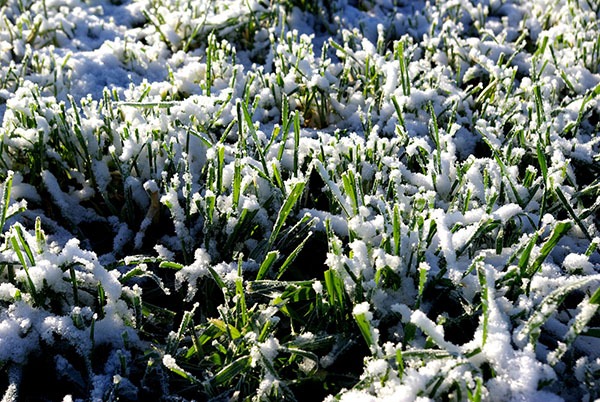
Just because it’s winter doesn’t mean you should ignore your lawn. In fact, winter is a great time to take care of your lawn and prepare it for the spring. Winter lawn care is less labor-intensive than summer chores but just as important. There are many different things that you can do to make sure that your lawn is healthy and vibrant all year round. We put together this list of 5 winter lawn care essentials to focus on this winter season.
Why You Need Winter Lawn Care
The winter months can be tough on your lawn. It is not only cold, but it is also dark and wet. If you want to keep your grass healthy and green through the winter, then you need to do a few things! These 5 essential winter lawn care tips will help protect and improve your turf during these harsh conditions.
Avoid Salt Damage
De-icing products often contain salt, which can damage your turf. When salt leaches into your turf, it causes “physiological drought .” This means that your grass will be unable to absorb water. If you live in an area where de-icing is necessary, make sure to use a product that is safe for plants.
To avoid winter lawn care salt damage, try using a brine solution instead of regular salt or choose an organic de-icing product with potassium chloride. You can also try to avoid using salt on your lawn as much as possible. Spread the salt evenly and avoid piling it up in one spot. If you do see damage from salt, you can try rinsing it off with water or using a mild detergent.
Remove Debris
In the winter months, it is important to remove leaves and other debris from your turf before they turn into ice balls. Fallen leaves and other debris can block sunlight and oxygen from reaching your grass. This will cause the grass to die and create an environment for pests and diseases to thrive.
Make sure to remove all of the debris from your lawn regularly throughout winter. These can cause major issues if you do not take them off your lawn! If possible, use a leaf blower rather than raking so that you don’t compact the soil underneath.
Minimize Compaction
Speaking of compacting soil underneath debris… You want to minimize this impact as much as possible! Heavy snowfall can cause compaction, which can damage your lawn. If you can, try to keep foot traffic and vehicles off of your lawn as much as possible during the winter.
Winter weather creates wet conditions which can lead to compaction. When this happens, especially when snow falls after a rain, the soil can become hard and dense – like a cement block.
This process may happen repeatedly over the winter, exacerbating the issue. Then come spring, you’ll have very dense ground to contend with, making it difficult to aerate. And if your soil is too dense, it will be difficult for new grass to grow deep roots and have a healthy growth cycle. Therefore, you should address the issue in the winter to prevent hard labor and weak roots in the spring.
Water Properly
Grass needs water even in winter! Winter water can be very hard for your lawn and winter weather often leads to drought-like conditions that impact plants in general. Make sure to give your lawn a good watering every few weeks. You don’t need to water as much as you do in the summer, but it is still important to provide some hydration.
While you may think that you don’t need to water your grass when it’s cold out, winter watering is actually one of the most important winter lawn care essentials. During winter months, try not to use sprinklers or other irrigation systems if possible.
However, we recommend using an automatic drip system during these colder times because it will allow you to control how much water goes onto your turf without wasting any excess runoff on sidewalks or driveways. This also helps prevent compaction by keeping heavy machinery off of wet soils while still giving them what they need.
Weed as Needed
Weeds will come up and flourish in the winter. If you want to prevent them from taking over your lawn, make sure to keep weeding regularly. Just ten minutes every week will have a huge impact on your lawn.
In fact, weeds can be a major problem in wintertime. They will quickly take over an unhealthy lawn and compete with grass for nutrients and sunlight. This is less of an issue in summer when your grass is more established and your lawn is being fed and watered more frequently. Thus, in the winter, make sure to weed your lawn regularly so that these plants don’t have a chance to get out of control.
Takeaways
These are just some of the essential things that you need to do to keep up with winter lawn care. If you want to keep your grass healthy and green, then make sure that you follow these winter lawn care essentials!
